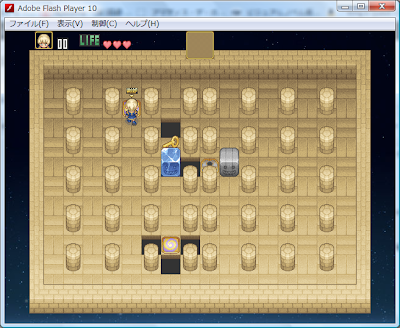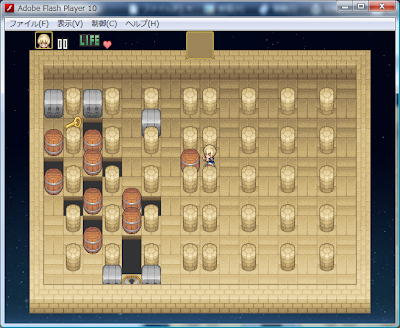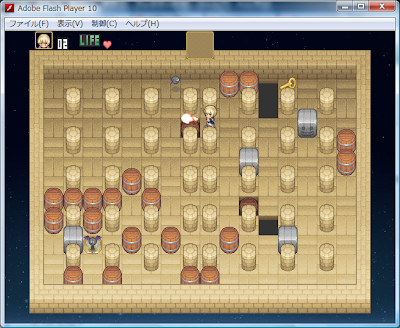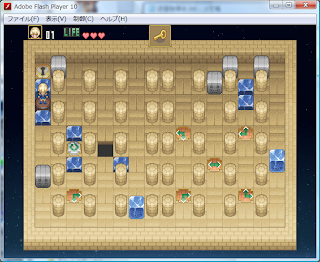---
Operator: Thank you for calling Better Living Through Puzzles, how may I help you?
Girl: Yeah, hi, I just got here today and I'm trying to move into my apartment, but there's all these barrels and pillars and creepy rock face people in my way.
Operator: Okay, what you're going to want to do is press the arrow keys to move around, press Z to generate a flaming ball of fire from the palm of your hands, X to go back to the main menu and C to commit suicide.
Girl: What?!
Operator: Glad you're following me. Now then, do you see a shiny golden key?
 |
| Does this make me a keyblade master? |
Girl: Uh, hold on, there it is. Yeah, I see it. Is that my apartment key?
Operator: No, that's just the key to the first level. What's your name?
Ruta: Ruta.
Operator: Your apartment is on level 51, you'll have to pass 50 levels to go there.
Ruta: How do I do that?
Operator: Get the key and stick it into the keyhole you see on the ground. You should then be sucked into an inter-dimensional vortex and transported to the next floor. You'll see we've also generated a nifty clear animation for you. Enjoy.
 |
| The first stage already contains a trick and by the third stage the game has completely warmed up into something dastardly, tricky and vermiciously knid. |
Ruta: Wait, I have to do this 50 times.
Operator: Yes, but don't fall into the gaps, or you'll lose hearts and lives.
Ruta: What?!
Operator: Well, if you want you can always get them back to start all over again.
Ruta: I don't wanna die!
Operator: Nobody does honey.
Ruta: Well, if I can just get them all back by re-starting or continuing, what's the point of them?
Operator: Tradition, honey.
Ruta: ...fine. But can you help? The key seems to be behind a barrel and I can't pull it out.
Operator: Of course you can't, we don't believe in being pully with objects. It objectifies them. You can push them around all you like, but don't you dare pull them!
 |
| Don't push my barrels, or I'll make you sit in the car again! |
Ruta: Why do I have to do this?
Operator: At Better Living Through Puzzles, we believe that life can be improved by enhancing the mundane tasks such as opening a door through the fun integration of multi-level puzzle dungeons. Better Living Through Puzzles, for a better, smarter tomorrow.
Ruta: So every time I want to enter my new home, I have to go through all 50 levels of this thing?
Operator: Yep, have a nice day and don't let the bats that appear later on kill you!
*click*
---
Operator: Thank you for calling Better--
Ruta: Why did you put bats in here?
Operator: We find they add a nice new twist to the rooms and keep them from becoming monotonous.
Ruta: Yeah, well when I get hit by them, they take my hearts and then I die in the middle of a puzzle!
Operator: At Better Living Through Puzzles, we believe in teaching residents to protect their hearts, lest they be hurt.
Ruta: How am I supposed to get rid of them?
Operator: You know that frustration that you can't just walk into your damn house? You can manifest that into a flaming ball of fire and shoot that at them.
 |
| Batman might not approve, but Ryu sure would! |
Ruta: Do you sell laser bursts from the eyes for when I encounter creepy, leering old men on the subway?
Operator: 'Fraid not. Thanks for calling and for heaven's sakes, don't die.
---
Operator: Thank you for calling--
Ruta: I notice that as the puzzles start introducing new ideas and get more complex, there's a host of different ways to complete them. If I do it particularly well, can I get a bonus, like an extra life?
Operator: Thank you praising our in-depth personality monitoring system, where the puzzle solvers find solutions based on the way they think. You are free to work out a variety of different ways to complete each stage. We're especially proud that unlike other inter-dimensional apartment challenge complexes, our puzzles change based on how you think them through and what type of player you are. We reflect the diverse personalities of our customers--
 |
| This one requires a creative mind and excellent timing. Or does it? |
Ruta: Are you reading from a script?
Operator: At Better Living Through Puzzles, we believe in increasing reading comprehension, by using only English in our puzzles, even though our manufacturer is Japanese. Anyone can play! Reading is good for you!
Ruta: Can you just tell me whether I can get a life or something for doing well?
Operator: Don't try to get a life, do well with the one you have. That's our motto at Better Living Through Puzzles.
 |
| Victory is celebrated with "You won the battle RPG music," while defeat is lamented with "Your party was defeated RPG music. |
Ruta: Fine. Gotta go. If I don't complete these damn puzzles soon, the milk and yogurt I bought from the store is going to go bad.
---
Operator: Thank you for--
Ruta: Hello again. You know the music here is nice and catchy, but there's only two types, and it's so short and loops so much it kind of gets on my nerves.
Operator: I'm sorry, sir, I'm afraid that's all we've got.
Ruta: Well, put on the radio then. Some smooth jazz would be nice.
Operator: None of that, either.
Ruta: Not even a little saxophone playing by a balding, middle-aged man?
Operator: Not even a little. Goodbye and thank you for calling Better Living Through Puzzles.
---
 |
| Headaches, you will get! Lovely fun headaches! |
Operator: Hi, Ruta.
Ruta: How'd you know it was me this time?
Operator: Lucky guess!
Ruta: Okay. Well, here's the thing. These puzzles are getting bloody hard! There's warp tiles and directional arrows and crumbling blocks and frozen blocks and switches that raise blocks and blocks that change the direction of the directional arrows, how am I supposed to keep track of all the possibilities?
Operator: Use your prefrontal cortex!
Ruta: My what?
 |
| By this point the game is every bit as tricky as Lolo or Solomon's Key. |
Operator: Better Living Through Puzzles is designed to stop you from being a troglodyte and reduce procrastination by making you think several steps ahead. If you don't, you'll burn your bridges and die. We think this a healthy lesson to teach our children.
Ruta: Aren't I your resident?
Operator: Oh, child please. The sad fact is that more and more people are giving into the urges and demands of their limbic system, which is a buried in a primitive part of the brain and causes you to eat ice cream until you get dumped by your boyfriend instead of thinking toward your bright, sexy future in the Bahamas together! If only your prefrontal cortex had been stronger and you were able to think ahead several steps so you don't meet disaster and regret!
 |
| One of my favorite stages. Can you figure it out? |
Ruta: Where are your getting this?
Operator: You know that guy who designed the robot masters?
Ruta: Dr. Wily?
Operator: Yeah, he told us it would strengthen the prefrontal cortex.
Ruta: ...
Operator: Hello? Hello?
---
Rating: Three rutabagas out of an unmolested lamb.
Comes recommended. Does not include above story. In English too! Download it here, at Japanese software portal site, Vector. (For those who don't know Japanese, click here where it says Download Now in green.) Some other games by the same group can be found here.
If you need help navigating either of those Japanese sites, let me know in the comments! And don't forget to remind Crazy Fat Ethel to bring back my Fig Newtons!




